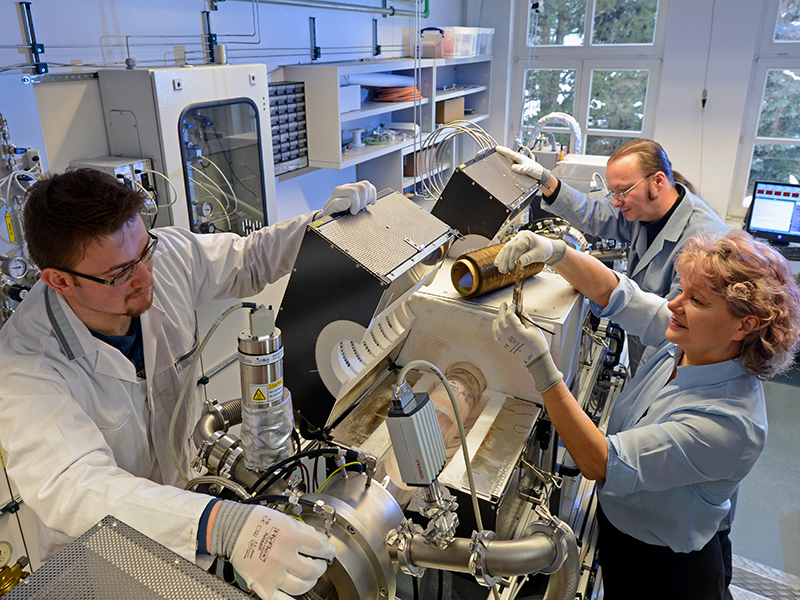Chemnitz’s Cutting-Edge Research Grows Even More International
Federal Cluster of Excellence MERGE of the TU Chemnitz is an important stimulus for sustainable development in the field of lightweight construction
-

Knowledge and technology transfer across national borders: In the future, MERGE will also serve as an important link between industry and science on the international level. Photo: Hendrik Schmidt
In global rankings of the export of research-intensive goods, Germany is ahead of the USA and Japan, but in second place behind China. In order to keep this prominent position, the Federal Government will strengthen the strategic internationalisation of cutting-edge research. As part of the funding measure “Internationalisation of top-level clusters, future projects and similar networks”, beginning now, eleven projects will be supported by the Federal Ministry of Education and Research (BMBF) with up to four million euros over a period of up to five years, for the international networking of highly innovative regions in Germany. This includes the Federal Cluster of Excellence “Merge Technologies for Multifunctional Lightweight Structures” (MERGE) at the Technische Universität Chemnitz. It is also the only cluster among the 43 clusters of excellence in Germany whose internationalisation is promoted in this way.
MERGE‘s interdisciplinary approach, bridging business and science, establishes a currently unique distinguishing feature in the landscape of German Clusters in the field of “lightweight construction”. In addition to large enterprises, the cluster also incorporates many SMEs, which complementarily illustrate the value chain “From Material to Lightweight Structure”. The results of the cluster’s project serve leading markets of the automotive industry, aerospace, mechanical engineering and microsystems technology. Thus, the companies involved - especially the Saxon SMEs – receive important incentives for their future sustainable business development. “With the internationalisation of our cluster, we want to further strengthen the innovation and competitiveness of our industry partners”, says MERGE CEO Prof. Dr. Lothar Kroll and adds: “In the tri-border region of Poland, the Czech Republic and Germany, we have already established highly promising collaborations and contacts that shall now be further extended and strengthened”.
“Germany is expected to continue to be a world leader in the export of high-tech goods in the future. Therefore, we promote global networking of science and industry. The new initiative will help companies, universities and research institutions take part in international innovation processes and make them more active”, said the Federal Research Minister Wanka. The selected projects were reviewed and recommended for funding by an independent panel of experts chaired by Margret Wintermantel, President of the German Academic Exchange Service (DAAD). The internationalisation of clusters and networks is part of the new High-Tech Strategy, which the Federal Government uses to turn ideas into innovations and to establish links between science and industry, research and society. At the same time, it is a building block in the Action Plan “International Cooperation” of the BMBF. Thus, future opportunities and the jobs of tomorrow can be created. Of the eleven sponsored Clusters and Networks, one other project aside from MERGE comes from Saxony - the Innovation Network Organic Electronics Saxony (OES). On June 30th, 2015, all of the selected projects will be officially awarded prizes by Minister Wanka during the 3rd International Cluster Conference of the BMBF. Two further rounds of funding are planned.
Keyword: Federal Cluster of Excellence “MERGE“
With the Federal Cluster of Excellence “Merge Technologies for Multifunctional Lightweight Structures” (MERGE), the Technische Universität Chemnitz is one of the winners of the Federal Excellence Initiative. This nationwide unique project includes around 100 scientists working in the field of technology fusion in lightweight construction. Their common goal is to consolidate currently separate manufacturing processes involved in processing different material groups such as textiles, plastics and metals. Multi-component parts can thus be mass produced more cost- and energy-efficiently. In the future, multifunctionality will be achieved in just one processing step. The Federal Cluster of Excellence was established in 2012 within the Excellence Initiative of the federal and state governments at the TU Chemnitz. By 2017, it will receive 34 million euros in funding. https://www.tu-chemnitz.de/merge
Mario Steinebach
11.06.2015




